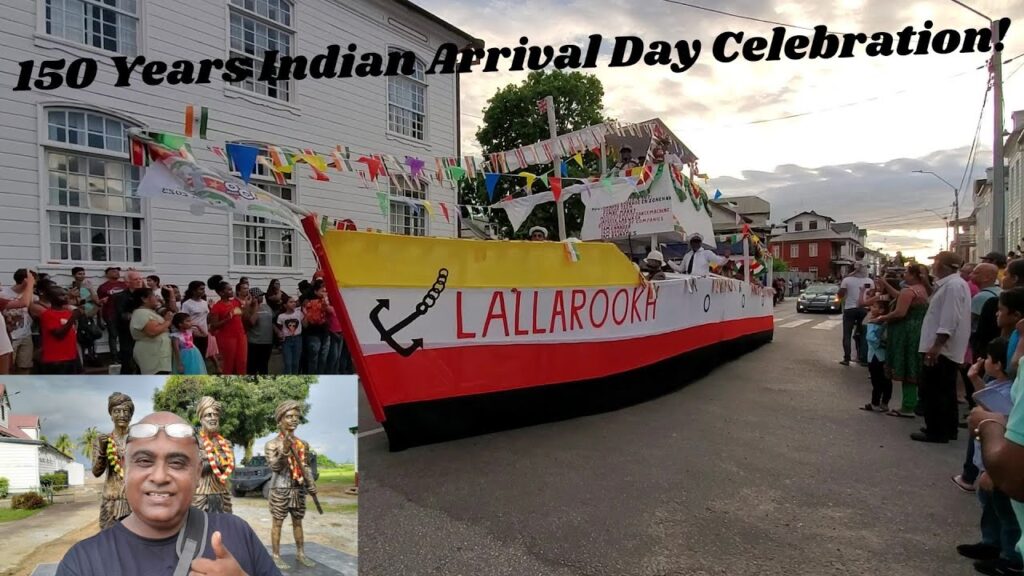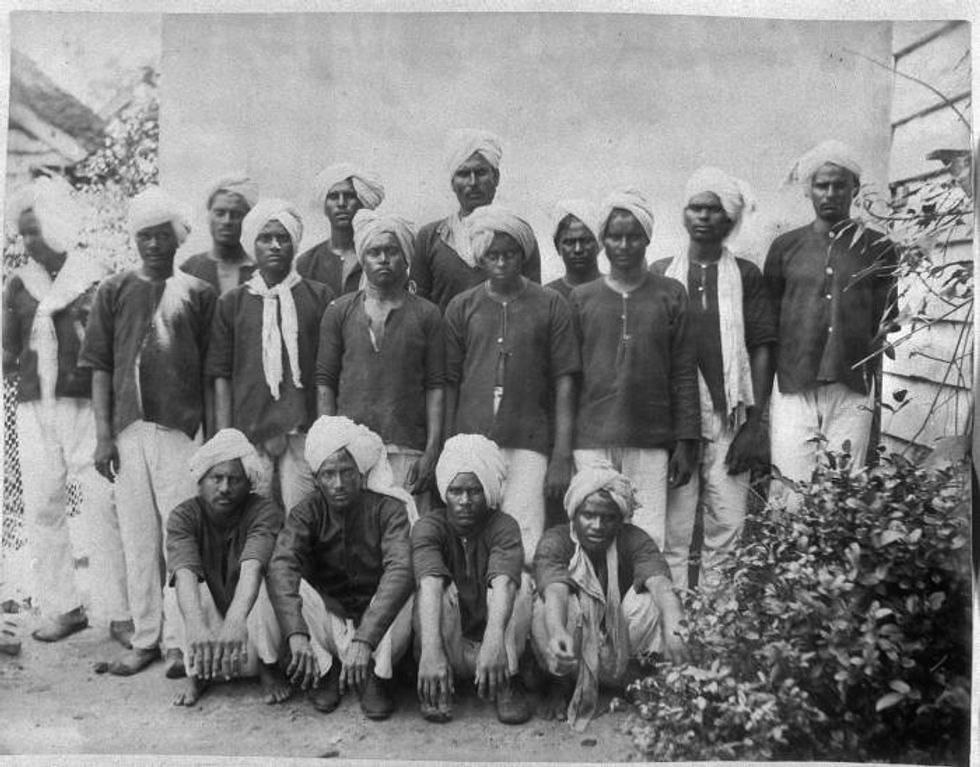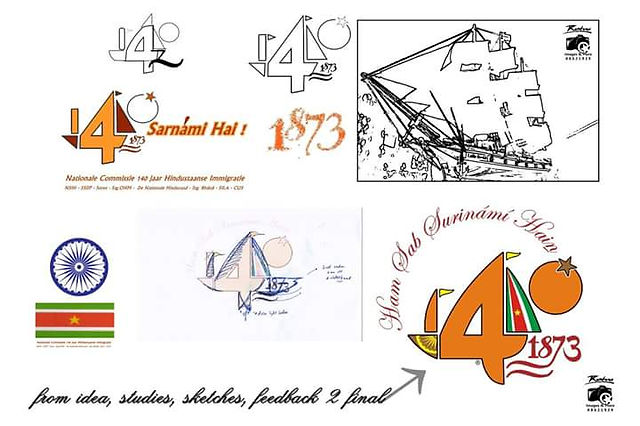Suriname, a small country on the northeastern coast of South America, holds a special celebration every year to commemorate the Indian Arrival Day. This significant occasion not only honors the legacy of Indian immigrants but also showcases the rich cultural heritage that they brought to Surinamese society. From vibrant parades and music performances to mouth-watering Indian cuisine, the festivities attract locals and tourists alike, offering a unique opportunity to immerse oneself in the history and traditions of Suriname. So pack your bags and get ready to experience the lively atmosphere of the Indian Arrival Day celebration in Suriname!
History of Indian Arrival in Suriname
Suriname has a rich and diverse cultural heritage, with Indian culture playing a significant role. The arrival of Indian indentured laborers in the late 19th and early 20th centuries greatly shaped Suriname’s cultural landscape.
Background of Indian indentured laborers in Suriname
During the colonial era, the Dutch plantation owners in Suriname faced a shortage of laborers to work on their sugar, coffee, and cocoa plantations. To address this issue, the Dutch government signed an agreement with the British Indian government to bring indentured laborers from India to Suriname.
Between 1873 and 1917, approximately 34,300 Indian laborers were brought to Suriname by British ships. These laborers came from various regions of India, including Uttar Pradesh, Bihar, and Tamil Nadu, and were mainly from the Hindu and Muslim communities. They embarked on a challenging journey crossing the Atlantic Ocean, enduring unfavorable conditions on the ships.
Conditions of Indian laborers in Suriname
Upon arrival in Suriname, Indian laborers were subjected to harsh working and living conditions. They were made to work long hours under the scorching sun, with minimal pay and poor living conditions. The plantation owners exercised strict control over the laborers, limiting their freedom and curbing their cultural practices.
Despite these challenging circumstances, the Indian indentured laborers managed to preserve and adapt their cultural traditions. They created close-knit communities, built temples and mosques, and passed down their language, beliefs, and customs to future generations.
Impact of Indian arrival on Surinamese society
The arrival of Indian laborers had a profound impact on Surinamese society. Their presence added to the vibrant cultural diversity of the country, enriching its cultural fabric. Indian traditions, music, dance, clothing, and cuisine became an integral part of Surinamese culture.
Indian laborers also contributed to the economy and infrastructure of Suriname. Many laborers eventually became successful entrepreneurs, opening businesses and contributing to the growth of the country. Their hard work and perseverance laid the foundation for future generations to prosper.
Significance of Indian Arrival Day
Indian Arrival Day is a special day in Suriname that holds immense significance for both the Indian community and the broader Surinamese society. It serves as a celebration of the Indian contribution to Surinamese culture and a reminder of the importance of cultural diversity and inclusivity.
Recognition of Indian contribution to Surinamese culture
Indian Arrival Day provides an opportunity to recognize and celebrate the immense contributions of the Indian community to Surinamese culture. It acknowledges the resilience and perseverance of the Indian indentured laborers who maintained their cultural identity despite the challenging circumstances.
The day also serves as a reminder of the cultural fusion that has taken place in Suriname. The blending of Indian, African, Dutch, and Indigenous cultures has created a unique Surinamese identity that is celebrated and cherished.
Preserving Indian cultural traditions in Suriname
Indian Arrival Day plays a crucial role in preserving Indian cultural traditions in Suriname. Through festivities, rituals, and cultural performances, the younger generations of Surinamese Indians have the opportunity to learn about their ancestral roots and keep their cultural heritage alive.
It serves as a platform for the transmission of knowledge, skills, and values from elders to younger generations. By actively participating in the celebration, young Surinamese Indians learn about their history, language, cuisine, and traditional crafts.
Promoting cultural diversity and inclusivity in Suriname
Indian Arrival Day is not only a celebration within the Indian community but also an invitation for all Surinamese people to come together and embrace cultural diversity. By recognizing and honoring the contributions of the Indian community, Suriname promotes inclusivity and a sense of unity among its diverse population.
The celebration of Indian Arrival Day encourages dialogue, understanding, and appreciation for different cultures, fostering a sense of respect and acceptance. It provides a platform for Surinamese people from all backgrounds to learn from each other, creating a more harmonious and cohesive society.

Celebrations and Festivities
Indian Arrival Day is marked by vibrant celebrations and festivities that showcase the rich Indian heritage and cultural expressions in Suriname.
Traditional Indian rituals and ceremonies
The day typically begins with traditional prayers and rituals at temples and mosques across Suriname. Indian priests lead the ceremonies, invoking blessings and offering gratitude for the legacy of the Indian indentured laborers.
These rituals are attended by both Surinamese Indians and members of other communities who come together to observe and learn about Indian customs and traditions.
Cultural performances and exhibitions
Indian Arrival Day is a platform for showcasing the diverse cultural performances of Surinamese Indians. Traditional dances, such as the Bhojpuri, Kathak, and Bharatanatyam, are performed, mesmerizing audiences with their grace and intricate movements.
Exhibitions featuring traditional Indian clothing, jewelry, and artifacts provide an opportunity to learn about the vibrant aesthetics and craftsmanship of Indian culture.
Indian cuisine and delicacies
Food is an essential part of any celebration, and Indian Arrival Day is no exception. Surinamese Indians prepare and share traditional Indian dishes, allowing others to experience the flavors and spices that characterize Indian cuisine.
Visitors are treated to mouthwatering delicacies such as samosas, biryanis, curries, and sweets like ladoos and jalebis. The aroma of these delectable creations fills the air, enticing everyone to indulge in the culinary delights.
Public Events and Activities
Indian Arrival Day extends its celebrations beyond the cultural gatherings to various public events and activities that engage the wider Surinamese community.
Parades and processions
Colorful parades and processions are held throughout Suriname, featuring floats adorned with traditional Indian motifs and costumes. These processions wind through the streets, accompanied by music, dance, and joyous celebration.
The parades create a festive atmosphere where Surinamese Indians proudly display their cultural heritage while inviting others to join in the merriment.
Speeches and presentations
Public speeches and presentations are an integral part of Indian Arrival Day. Prominent individuals from the Indian community and government officials address the audience, emphasizing the importance of cultural diversity, unity, and equal opportunities.
These speeches serve to educate the public about the history and contributions of the Indian indentured laborers, inspiring a sense of admiration and appreciation for their endurance and accomplishments.
Cultural workshops and demonstrations
To further deepen the understanding and appreciation of Indian culture, cultural workshops and demonstrations are organized. These events allow participants to actively engage in various aspects of Indian traditions, such as henna art, yoga sessions, traditional music lessons, and art and craft workshops.
Participants gain firsthand experience and knowledge of Indian cultural practices, fostering cross-cultural understanding and promoting cultural exchange.

Visiting Historic Sites
Suriname offers several historic sites that showcase the enduring legacy of Indian indentured laborers and their contributions to the country’s development.
Jaggernath Lachmon Monument
The Jaggernath Lachmon Monument is a significant landmark dedicated to one of Suriname’s most prominent Indian politicians. Jaggernath Lachmon, of Indian descent, played a pivotal role in advocating for the rights and recognition of the Indian community in Suriname.
The monument stands as a tribute to his tireless efforts and serves as a reminder of the importance of cultural and political representation.
Baba and Mai Monument
The Baba and Mai Monument is a sacred site that honors the ancestral spirits and Indian cultural heritage. Surinamese Indians pay homage to Baba and Mai, spiritual guardians who guide and protect the Indian community.
Visitors can witness traditional rituals and observe the deep spiritual connection between Surinamese Indians and their ancestors.
Haveli Temple
The Haveli Temple is a testament to the religious devotion and architectural influence of the Indian community in Suriname. The temple’s intricate carvings and vibrant colors reflect the beauty of Indian craftsmanship.
Inside, visitors can witness the reverence and devotion Surinamese Indians have for their gods through the various rituals and prayers performed.
Indian Arrival Day Awards
Indian Arrival Day serves as a platform to recognize and honor individuals and organizations that have made significant contributions to the preservation and promotion of Indian culture in Suriname.
Recognition of individuals and organizations promoting Indian culture
The Indian Arrival Day Awards celebrate individuals and organizations that have been instrumental in preserving and promoting Indian cultural heritage in Suriname. These awards acknowledge their dedication, passion, and commitment to ensuring that Indian traditions and values thrive in Surinamese society.
Recipients of the awards are those who have made a notable impact through their artistic expressions, community initiatives, educational programs, or philanthropic endeavors.
Categories and criteria for the awards
The Indian Arrival Day Awards encompass various categories, including arts and literature, music and dance, community service, education and research, and entrepreneurship. Each category has specific criteria that reflect the unique contributions made by individuals and organizations within that domain.
The awards committee carefully evaluates nominees based on their impact, innovation, and dedication to preserving and promoting Indian culture.
Previous recipients and their contributions
In previous years, the Indian Arrival Day Awards have been bestowed upon individuals and organizations that have significantly contributed to Suriname’s cultural landscape. Recipients include acclaimed artists, musicians, writers, educators, and community leaders who have made lasting contributions to the preservation of Indian cultural traditions in Suriname.
Their efforts have helped raise awareness and appreciation for Indian culture and have acted as catalysts for the younger generations to explore and embrace their cultural heritage.

Community Initiatives
Community initiatives play a vital role in preserving and promoting Indian culture in Suriname beyond Indian Arrival Day. These initiatives serve as catalysts for cultural exchange and engagement within and outside the Surinamese Indian community.
Cultural exchange programs
Cultural exchange programs aim to promote understanding and appreciation for Indian culture by bringing together individuals from diverse backgrounds. These programs facilitate the sharing of experiences, knowledge, and traditions, fostering mutual respect and harmony.
Surinamese Indians actively participate in cultural exchange initiatives, organizing events, workshops, and exhibitions where people from different cultural backgrounds can interact and celebrate the richness of Surinamese Indian heritage.
Sociocultural organizations promoting Indian heritage
Several sociocultural organizations play a pivotal role in the preservation and promotion of Indian heritage in Suriname. These organizations organize cultural events, educational programs, and community outreach initiatives to ensure that Indian traditions and values remain alive and vibrant.
Through their activities, these organizations provide platforms for the community to come together, exchange ideas, and strengthen their cultural identity.
Youth involvement and initiatives
Engaging the younger generation is crucial for the continued preservation and promotion of Indian culture. Youth initiatives are designed to inspire and empower young Surinamese Indians to contribute to their cultural heritage.
These initiatives include mentorship programs, leadership development workshops, and educational activities that encourage young Surinamese Indians to explore their cultural roots and actively participate in cultural events and celebrations.
Indian Arrival Day in Schools
Schools play a vital role in imparting knowledge and appreciation for Indian culture to younger generations. Indian Arrival Day is commemorated in schools through various educational activities and programs.
Educational activities and programs
Schools organize educational activities and programs to familiarize students with the history, contributions, and cultural practices of Surinamese Indians. Students engage in research projects, presentations, and group discussions that promote dialogue and deepen their understanding.
These activities help students develop a sense of cultural sensitivity and respect for cultural diversity, nurturing a broader perspective of Surinamese history and heritage.
Teaching Indian history and heritage
As part of the curriculum, schools teach Indian history and heritage, providing students with a comprehensive understanding of the Indian indentured laborers’ journey and the subsequent contributions they made to Surinamese society.
Through interactive lessons and discussions, students learn about important historical events, influential individuals, and the enduring traditions of the Surinamese Indian community.
Student presentations and performances
Indian Arrival Day provides an opportunity for students to showcase their understanding and appreciation for Indian culture through presentations and performances. Students prepare speeches, poetry recitations, musical performances, and traditional dances to share with their peers, teachers, and parents.
These presentations foster a sense of pride and confidence in students, allowing them to actively contribute to the celebration while embracing their cultural roots.

Tourism and Travel Opportunities
For tourists and travelers, Indian Arrival Day offers unique opportunities to explore Suriname’s Indian heritage and engage in cultural experiences.
Indian heritage tours in Suriname
Indian heritage tours are specially organized for visitors to experience the richness of Surinamese Indian culture. These tours take tourists to historic sites, cultural landmarks, and vibrant neighborhoods where they can witness daily life and engage with the local community.
Tourists have the chance to learn about Indian traditions, taste authentic Indian cuisine, and appreciate the architectural influence of Indian culture on Surinamese buildings.
Visiting Indian temples and mosques
Suriname is home to numerous temples and mosques that beautifully showcase Indian architectural styles and sacred rituals. Visitors can visit these religious sites, observe traditional ceremonies, and immerse themselves in the spiritual ambiance.
They also have the opportunity to interact with the priests, learn about the significance of the various deities or Islamic practices, and gain a deeper understanding of religious practices within Surinamese Indian communities.
Exploring Indian-influenced architecture and neighborhoods
Indian Arrival Day presents a chance for tourists to explore neighborhoods that have been historically shaped by Indian culture. These neighborhoods often have distinct characteristics, such as vibrant colors, intricate carvings, and bustling marketplaces.
Tourists can stroll through these neighborhoods, admire the Indian-inspired architecture, and engage with local artisans and shopkeepers. They can also savor traditional Indian street food and shop for souvenirs and handicrafts that reflect Indian craftsmanship.
The Future of Indian Arrival Day
As Suriname continues to celebrate and honor its Indian heritage, Indian Arrival Day holds immense potential for the future.
Continued celebration and preservation of Indian culture
The celebration of Indian Arrival Day will continue to be a cornerstone of Surinamese culture, ensuring the preservation and promotion of Indian heritage. The efforts to preserve Indian culture will involve ongoing education, community initiatives, and appreciation for the arts.
By embracing and celebrating Indian culture, Suriname can inspire future generations to be proud of their heritage while fostering an inclusive and diverse society.
Expanding international awareness and participation
Indian Arrival Day has the potential to become an international celebration, attracting tourists from around the world who wish to learn about and experience Suriname’s Indian heritage. Continued efforts to promote Indian Arrival Day on an international scale can increase awareness and attract visitors who are interested in cultural experiences.
Suriname can collaborate with other countries to create exchange programs and joint initiatives that promote cultural diversity and foster cultural understanding.
Collaboration with other cultural festivals and events
Indian Arrival Day can collaborate with other cultural festivals and events in Suriname to create a more vibrant and inclusive celebration. By joining forces with events that celebrate Surinamese African, Dutch, Indigenous, and other cultural heritages, Indian Arrival Day can create a platform for cultural exchange and dialogue.
Such collaborations can strengthen the bonds between communities, promote unity, and create a stronger sense of national identity.
In conclusion, Indian Arrival Day in Suriname is a celebration that encapsulates the rich history, cultural diversity, and spirit of inclusivity that characterize Surinamese society. From its challenging origins to the vibrant celebrations of today, Indian Arrival Day serves as a tribute to the Indian indentured laborers and their enduring legacy. By preserving and promoting Indian culture, Suriname embraces its multicultural heritage and paves the way for a future that respects and cherishes the contributions of all its communities.

